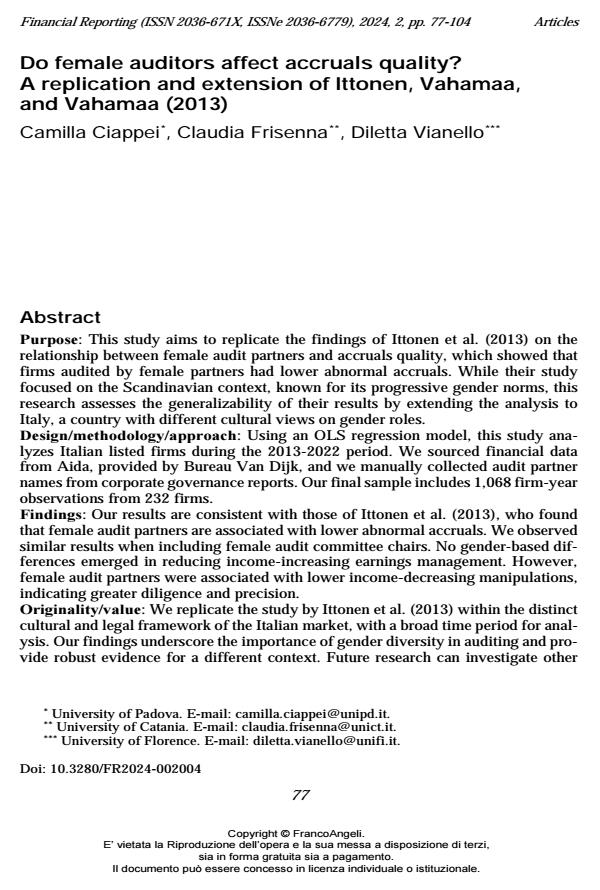Do female auditors affect accruals quality? A replication and extension of Ittonen, Vahamaa, and Vahamaa (2013)
Titolo Rivista FINANCIAL REPORTING
Autori/Curatori Camilla Ciappei, Claudia Frisenna, Diletta Vianello
Anno di pubblicazione 2024 Fascicolo 2024/2
Lingua Inglese Numero pagine 28 P. 77-104 Dimensione file 350 KB
DOI 10.3280/FR2024-002004
Il DOI è il codice a barre della proprietà intellettuale: per saperne di più
clicca qui
Qui sotto puoi vedere in anteprima la prima pagina di questo articolo.
Se questo articolo ti interessa, lo puoi acquistare (e scaricare in formato pdf) seguendo le facili indicazioni per acquistare il download credit. Acquista Download Credits per scaricare questo Articolo in formato PDF

FrancoAngeli è membro della Publishers International Linking Association, Inc (PILA), associazione indipendente e non profit per facilitare (attraverso i servizi tecnologici implementati da CrossRef.org) l’accesso degli studiosi ai contenuti digitali nelle pubblicazioni professionali e scientifiche.
Purpose: This study aims to replicate the findings of Ittonen et al. (2013) on the relationship between female audit partners and accruals quality, which showed that firms audited by female partners had lower abnormal accruals. While their study focused on the Scandinavian context, known for its progressive gender norms, this research assesses the generalizability of their results by extending the analysis to Italy, a country with different cultural views on gender roles. Design/methodology/approach: Using an OLS regression model, this study analyzes Italian listed firms during the 2013-2022 period. We sourced financial data from Aida, provided by Bureau Van Dijk, and we manually collected audit partner names from corporate governance reports. Our final sample includes 1,068 firm-year observations from 232 firms. Findings: Our results are consistent with those of Ittonen et al. (2013), who found that female audit partners are associated with lower abnormal accruals. We observed similar results when including female audit committee chairs. No gender-based differences emerged in reducing income-increasing earnings management. However, female audit partners were associated with lower income-decreasing manipulations, indicating greater diligence and precision. Originality/value: We replicate the study by Ittonen et al. (2013) within the distinct cultural and legal framework of the Italian market, with a broad time period for analysis. Our findings underscore the importance of gender diversity in auditing and provide robust evidence for a different context. Future research can investigate other countries and factors affecting audit quality to further deepen the understanding of gender dynamics.
Parole chiave:female auditors, auditor gender, gender diversity, abnormal accruals, earnings management
Jel codes:M42, M14, G32, D81, J16
Camilla Ciappei, Claudia Frisenna, Diletta Vianello, Do female auditors affect accruals quality? A replication and extension of Ittonen, Vahamaa, and Vahamaa (2013) in "FINANCIAL REPORTING" 2/2024, pp 77-104, DOI: 10.3280/FR2024-002004